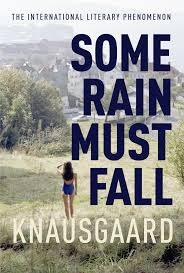
SOME RAIN MUST FALL is Book 5 of 6, and as with the others nothing happens. Yet somehow you can’t stop reading, and when it’s over you feel awfully sad and lonely.
I pity the poor blurb writer, who tries to give it a plot, telling how the main character (i.e., the author) arrives at university “full of excitement and writerly aspirations. Soon though, he is stripped of youthful illusions. His writing is revealed to be puerile . . . and his social efforts are a dismal failure. Awkward in company and hopeless with women, he drowns his shame in drink and rock music.”
This is indeed sort of true, but also not true. It’s the kind of falsity that comes from trying to summarise any real life: imagine trying to summarise your own, even over a few years. It makes me feel sweaty just to consider it, an attempt to assign so much meaning. And Karl Ove has not attempted it. He tells us as usual his day by day, with us left to construct the story around it. It makes the books both boring and wonderful, much like real life.
He rarely steps out of his day to day, but here’s one time, which captures some sense of what I think he’s going for:
Once we were seventeen, once we were thirty-five, once we were fifty-four. Did we remember that day? 9 January 1997, when we went into REMA 1000 to do our shopping and came out again with a bag in each hand and walked down to the car, put the bags on the ground and unlocked the door, placed the bags on the back seat and got in? Beneath the darkening sky, by the sea, the forest behind, black and bare?
Or here talking about something else he refers to “. . .Life as it unfolded around me, with the trivial incidents that make up all lives and can suddenly shine bright in the dusk of meaninglessness; the door goes, she comes home, bends over and takes off her shoes . . .”
The early section has much to say on his issues with masturbation (I had mercifully forgotten about this problem) and the various horribly embarrassing social situations he creates (though in this book he finally admits what I had guessed from his author photo, but would never have guessed from the way he writes about himself: he is good looking). I’m blown away once again by his picture of life in Scandinavia, which seems wildly improbable to a Zimbabwean: his life story does not involve at any point revolve around government decisions, and his choices are largely funded by the state. At one point he says Rome is the most chaotic place he’s ever been to. Can you imagine Western Europe being your bar for chaos?
This book ends where book 1 began, so I am assuming the last book, Book 6, will take us into the present day. I haven’t even begun it yet, as it’s not out in English, but I’ve already begun mourning its end.
